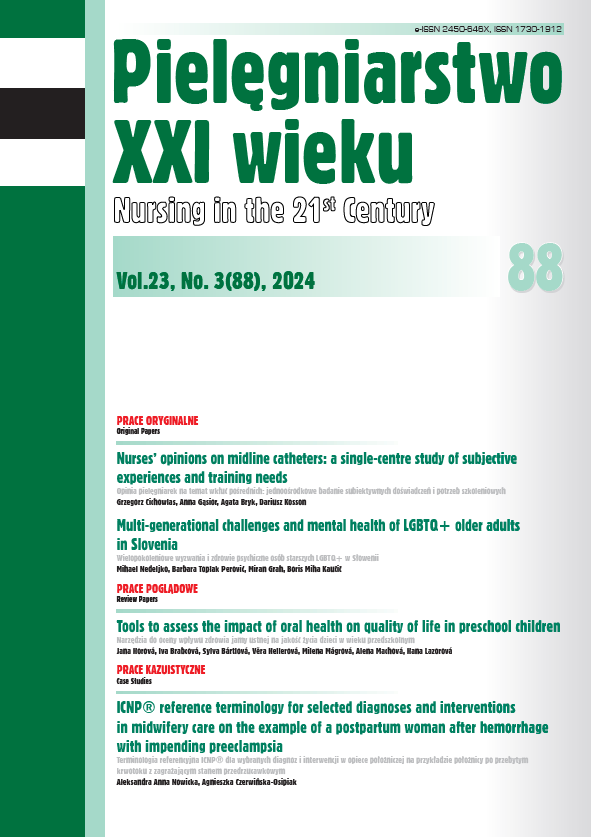Multi-generational challenges and mental health of LGBTQ+ older adults in Slovenia
DOI:
https://doi.org/10.2478/pielxxiw-2024-0033Keywords:
resilience, discrimination, minority stress, mental health, LGBTQ+ older adultsAbstract
MULTI-GENERATIONAL CHALLENGES AND MENTAL HEALTH OF LGBTQ+ OLDER ADULTS IN SLOVENIA
Aim. The purpose of the study was to determine whether diff erences in mental health exist among younger and older generations of LGBTQ+ older adults.
Material and methods. A quantitative approach was taken. The questionnaire was completed by 318 LGBTQ+ older adults (50+) from Slovenia who met the inclusion criteria and were selected using a non-random purposive sample. For statistical analysis, we used exploratory factor analysis (EFA) and the Mann-Whitney U test to compare the two independent groups.
Results. We received 318 fully completed questionnaires in the survey. EFA extracted one factor. The results demonstrate statistically signifi cant diff erences in mental health between younger and older generations of LGBTQ+ older adults for two items: I often experience stress and I have become more resilient due to facing many inequalities in society. The younger generation of LGBTQ+ older adults is more likely to report experiencing stress, but at the same time expresses a sense of resilience.
Conclusions. Despite the stress, LGBTQ+ older adults – especially the younger generation – have developed resilience to overcome challenges and improve mental health. Addressing the specific needs of LGBTQ+ older adults and improving their mental health requires elimination of prejudice and discrimination, and taking into account the complexity of their identities and experiences.
References
1. United Nations Department of Economic and Social Affairs PD. World Population Ageing 2020 Highlights: Living arrangements of older persons 2020.
2. Emlet CA. Social, economic, and health disparities among LGBT older adults. Generations. 2016;40(2):16-22.
3. Bloemen EM, Rosen T, LoFaso VM, et al. Lesbian, Gay, Bisexual, and Transgender Older Adults' Experiences With Elder Abuse and Neglect. JAGS. 2019;67(11):2338-2345.
4. Lagana L, Balian OA, Nakhla MZ, et al. A preliminary model of health regarding sexual and ethnic minority older adults. CHS. 2021;23(3):333-348.
5. Goldsen KF. Shifting social context in the lives of LGBTQ older adults. Public Policy & Aging Report. 2018;28(1):24-28.
6. Nourafshan AM. The new employment discrimination: Intra-LGBT intersectional invisibility and the marginalization of minority subclasses in antidiscrimination law. Duke J. Gender L & Pol'y. 2016;24:107.
7. Yarns BC, Abrams JM, Meeks TW, et al. The mental health of older LGBT adults. Curr. Psychiatry Rep. 2016;18:1-11.
8. Perone AK, Ingersoll-Dayton B, Watkins-Dukhie K. Social isolation loneliness among LGBT older adults: Lessons learned from a pilot friendly caller program. Clin. Soc. Work J. 2020;48(1):126-139.
9. MongeLli F, Perrone D, BaLducci J, et al. Minority stress and mental health among LGBT populations: An update on the evidence. Minerva Psichiatr. 2019;60(1):27-50.
10. McCann E, Sharek D, Higgins A, et al. Lesbian, gay, bisexual and transgender older people in Ireland: Mental health issues. Aging Ment. Health. 2013;17(3):358-65.
11. Fredriksen-Goldsen KI, Emlet CA, Kim H-J, et al. The physical and mental health of lesbian, gay male, and bisexual (LGB) older adults: The role of key health indicators and risk and protective factors. The Gerontologist. 2013;53(4):664-675.
12. Jurček A, Urek M, Sobočan AM. Življenja LGBTQ+ starejših od 50 let v času epidemije covida-19. Soc Delo J. 2022;61(1).
13. Nedeljko M, Toplak-Perović B, Grah M, et al. Exploring Disparities in Life Satisfaction among LGBTQ+ Older Adults in different Living Environments: The Case of Slovenia. Open Access Maced. J. Med. Sci. 2024.
14. Jerala N, Petek D. Enhancing LGBT + primary healthcare in Slovenia: A national qualitative study of experiences and expectations of LGBT + people and family doctors. EJGP. 2024;30(1):2373121.
15. Peel E, Rivers I, Tyler A, et al. Exploring LGBT resilience and moving beyond a deficit-model: findings from a qualitative study in England. Psychol. Sex.. 2023;14(1):114-126.
16. Pachankis JE, Sullivan TJ, Feinstein BA, et al. Young adult gay and bisexual men’s stigma experiences and mental health: An 8-year longitudinal study. Dev. Psychol.. 2018;54(7):1381.
17. Reker GT. Successful Aging Scale (SAS). Trent University. 2009:1-14
18. Brečko BN. Istospolno usmerjeni: metodologija raziskovanja skritih populacij. Družboslovne razprave. 2005;21(49-50):107-118.
19. Tourangeau R, Smith TW. Asking sensitive questions: The impact of data collection mode, question format, and question context. Public opinion quarterly. 1996;60(2):275-304.
20. Kaiser HF. An index of factorial simplicity. Psychometrika. 1974;39(1):31-6.
21. Costello AB, Osborne J. Best practices in exploratory factor analysis: Four recommendations for getting the most from your analysis. Practical assessment, research, and evaluation. 2019;10(1):7.
22. Hair JR, Anderson RE, Tatham RL, et al. Multivariate Data Analysis. Upper Saddle River, NJ: Prentise-Hall. Inc; 1998.
23. Milenović Ž. Application of Mann-Whitney U test in research of professional training of primary school teachers. Metodički obzori: časopis za odgojno-obrazovnu teoriju i praksu. 2011;6(11):73-79.
24. Wen J, Shi Y-k, Li Y-p, et al. Quality of life, physical diseases, and psychological impairment among survivors 3 years after Wenchuan earthquake: a population based survey. PloS one. 2012;7(8):e43081-e.
25. Frost DM, Lehavot K, Meyer IH. Minority stress and physical health among sexual minority individuals. J. Behav. Med. 2015;38:1-8.
26. Gonzales G, Henning-Smith C. Health disparities by sexual orientation: Results and implications from the Behavioral Risk Factor Surveillance System. J. Community Health. 2017;42:1163-72.
27. Singh AA. Understanding trauma and supporting resilience with LGBT people of color. Trauma, resilience, and health promotion in LGBT patients: What every healthcare provider should know. Springer. 2017:113-9.
Downloads
Published
Issue
Section
License
Copyright (c) 2024 Authors

This work is licensed under a Creative Commons Attribution 4.0 International License.




